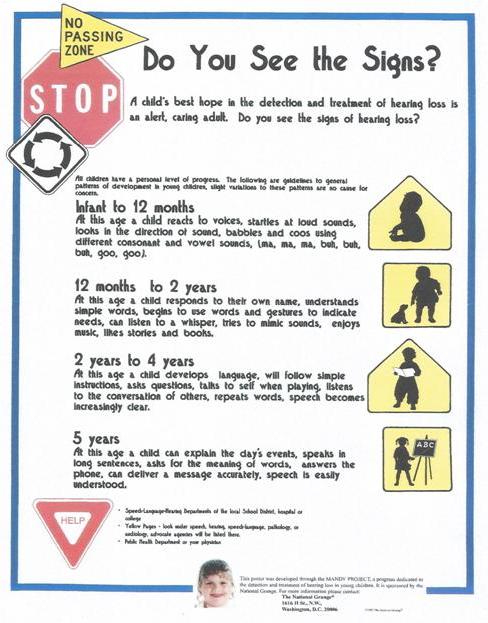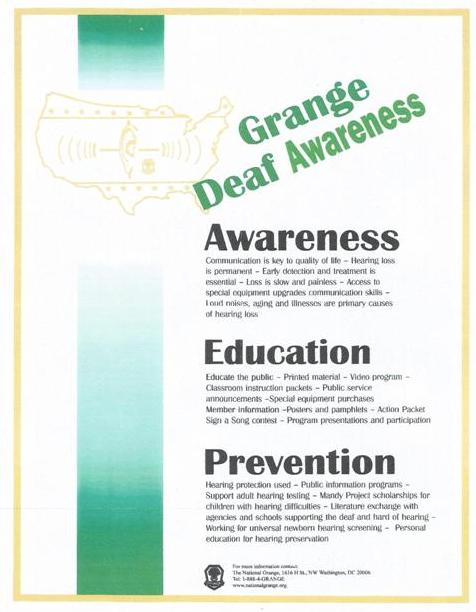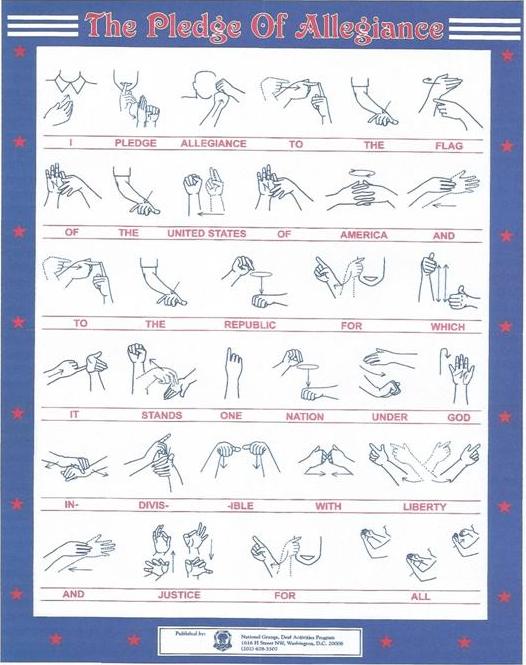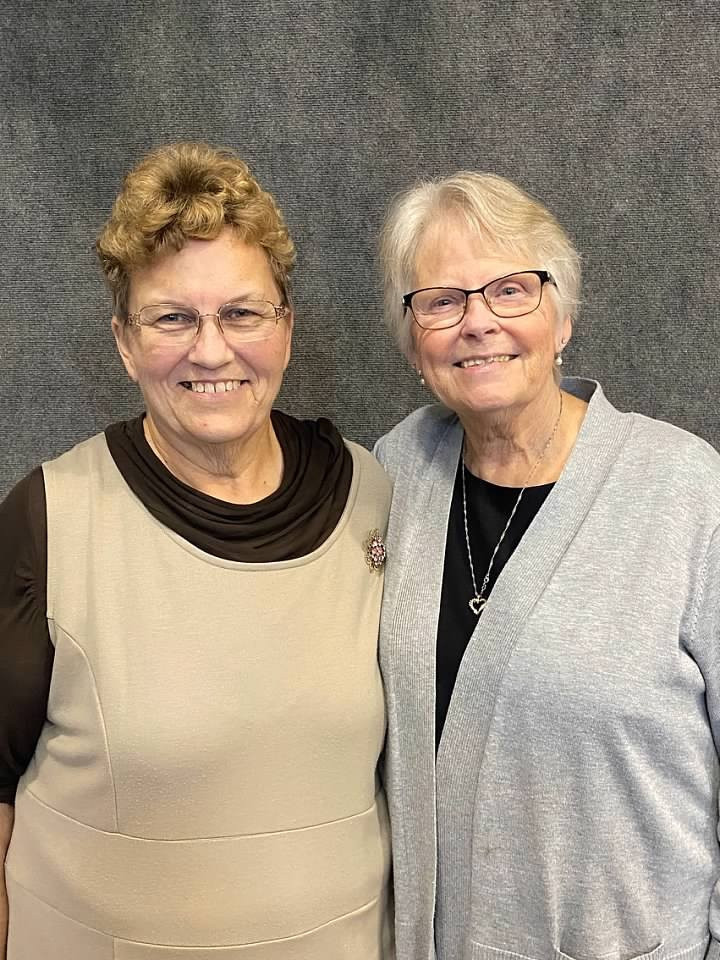PEGGY JOHNSTON, CO-DIRECTOR
404 S. Oak Street
404 S. Oak Street
Durand, MI 48429
989-288-4546
517-285-6532
jklbmc@yahoo.com
SHARON POPLER, CO-DIRECTOR
SHARON POPLER, CO-DIRECTOR
3640 E. Bath Road
Morrice, MI 48857
Tel: 989-634-5748
gma4hugs@hotmail.com
DEAF AWARENESS
POSTERS ARE NOW AVAILABLE!
We now have reprints of four of the previous Deaf Awareness Posters. Contact me if you wish to have posters, etc.
American Manual Alphabet: This poster is one that we did not have to reprint. This poster could be used in schools, churches, libraries, Grange Halls or anywhere that people come in contact with deaf or hearing impaired people. For example, our Grange delivered Dictionaries to a third grade classroom, along with Deaf Awareness items (one being the Manual Alphabet poster) and in one of the thank you’s we received, one of the students had learned the alphabet. Another third grade teacher had her students do their spelling words in sign language. There are many possibilities with this.
Pledge of Allegiance: This poster could be placed in schools, Grange Halls, libraries, etc. An idea that can be used is to do parts of it at each of your Grange meetings until everyone can sign it.
Do You See the Signs: (of hearing loss) This poster could be placed in church nurseries, day care centers, pre-schools or wherever adults can view them. It is a poster to make parents aware of what an infant to 12 months should be able to do, from 12 months to 2 years, from 2 years to 4 years and 5 years old.
Grange Deaf Awareness: Awareness – communication is key to qualify of life – hearing loss is permanent- early detection and treatment is essential, etc. Education – educate the public with printed material, video programs, classroom instruction, special equipment, information, programs. Prevention- hearing protections used, hearing testing, newborn hearing screening, personal education.
We now have reprints of four of the previous Deaf Awareness Posters. Contact me if you wish to have posters, etc.
American Manual Alphabet: This poster is one that we did not have to reprint. This poster could be used in schools, churches, libraries, Grange Halls or anywhere that people come in contact with deaf or hearing impaired people. For example, our Grange delivered Dictionaries to a third grade classroom, along with Deaf Awareness items (one being the Manual Alphabet poster) and in one of the thank you’s we received, one of the students had learned the alphabet. Another third grade teacher had her students do their spelling words in sign language. There are many possibilities with this.
Pledge of Allegiance: This poster could be placed in schools, Grange Halls, libraries, etc. An idea that can be used is to do parts of it at each of your Grange meetings until everyone can sign it.
Do You See the Signs: (of hearing loss) This poster could be placed in church nurseries, day care centers, pre-schools or wherever adults can view them. It is a poster to make parents aware of what an infant to 12 months should be able to do, from 12 months to 2 years, from 2 years to 4 years and 5 years old.
Grange Deaf Awareness: Awareness – communication is key to qualify of life – hearing loss is permanent- early detection and treatment is essential, etc. Education – educate the public with printed material, video programs, classroom instruction, special equipment, information, programs. Prevention- hearing protections used, hearing testing, newborn hearing screening, personal education.
SEPTEMBER/OCTOBER 2025 GRANGE NEWS
Sharon and I look forward to seeing many of you at the convention in October. We hope that every Grange is encouraging your members to enter the contests available to you in the departments.
We would really like to see many entries in the two contests we have for Deaf Awareness this year. We are looking forward to some really cute decorated T-shirts (Just make sure you have the I Love You sign on it)
Judging: The judging will be on creativity, Sending of message and neatness.
Rules:
~~~~~~~~~~~~~~~~~~~~~
Introducing the New Deaf Awareness Micro Certificate
National Deaf Center (NDC) is launching a new learning opportunity; the Deaf Awareness Micro Certificate! This self-paced program is designed for everyone—disability service professionals in higher ed, postsecondary training professionals, ASL students, educators, and service providers. This certificate provides foundational knowledge to help professionals improve educational and training program
Sharon and I look forward to seeing many of you at the convention in October. We hope that every Grange is encouraging your members to enter the contests available to you in the departments.
We would really like to see many entries in the two contests we have for Deaf Awareness this year. We are looking forward to some really cute decorated T-shirts (Just make sure you have the I Love You sign on it)
Below are the rules for both of the contests in our department…
Deaf Awareness Poster Contest
Purpose: To increase Deaf Awareness:
Poster Theme: How Can You Be More Aware of Deafness
Who may enter:
Division I Junior Grange members ages 8 and under
Division II Junior Grange members ages 9-11
Division III Junior Grange members ages 12-14
(open to Junior Grange members, children and grandchildren of members)
1st place — $5.00, 2nd place — $3.00, 3rd place — $1.00
Division IV Subordinate Grange members, friends and relatives
1st, 2nd, and 3rd place ribbons. All entries will receive participant ribbons.
Judging: The judging will be on creativity, Sending of message and neatness.
Rules:
- Poster to be made on poster board. (max. size 18 x 24 inches) Crayons, markers, pencils, pens, cut out pictures, and/or photos can be used.
- The name of the entrant is to be placed on the back of the poster along with (age as of Jan. 1st for Juniors) Junior or Subordinate Grange name and number and county.
Entry Deadline: The poster is to be at the State Grange Convention by Friday morning at 9:00 a.m. Bring it in or send it with delegates and take to where the Deaf Awareness Display is.
Deaf Awareness T-Shirt Contest
Craft Topic: Use of “I Love You” Sign
- Decorate a T-shirt, with the I Love You Sign.
- Can be made of any t-shirt (purchased or handmade.
- Any style as long as it has the “I Love You” sign on it somewhere.
- “I Love You” sign can be embroidered, painted, drawn with pens, sewn on, etc.
Size: Division I Junior Grange members
1st place — $5.00, 2nd place — $3.00, 3rd place — $1.00
Division II Subordinate Grange members
1st, 2nd, and 3rd place ribbons. All entries will receive participant ribbons.
All entries are to be at the State Grange Convention by Friday morning at 9:00 a.m. and taken to where the Deaf Awareness display is with Division, the entrants name, Grange name and number and county.
~~~~~~~~~~~~~~~~~~~~~
Introducing the New Deaf Awareness Micro Certificate
National Deaf Center (NDC) is launching a new learning opportunity; the Deaf Awareness Micro Certificate! This self-paced program is designed for everyone—disability service professionals in higher ed, postsecondary training professionals, ASL students, educators, and service providers. This certificate provides foundational knowledge to help professionals improve educational and training program
experiences for deaf students.
The micro certificate is a series of online learning modules that cover topics like lived deaf experiences in education settings, the impact of attitudes and assumptions on deaf people, and existing barriers for deaf people within systems. The goal is to help those working with deaf individuals gain a deeper understanding of the deaf communities they work with and the challenges facing deaf students.



NOVEMBER/DECEMBER 2025 GRANGE NEWS
This year the contests that were planned were decorated t-shirts with the “I Love You” sign on them or a poster with a theme of “How to become more aware of deafness”
Poster winners:
Decorated T-shirts
******************
ADOPT-A-CHILD GRANGES
REPORTS FILED
This year the contests that were planned were decorated t-shirts with the “I Love You” sign on them or a poster with a theme of “How to become more aware of deafness”
Poster winners:
Juniors ages 7-8
1st place Olivia Sivyer Burns Grange #160
Best of Show Winner for Deaf Awareness Dept.
Adults:
1st place: Peggy Johnston Burns Grange #160
2nd place: Dale Moore Burns Grange #160
Decorated T-shirts
Adults:
1st place Sharon Popler Burns Grange #160
2nd place Naomi Fletcher Burns Grange #160
3rd place Peggy Johnston Burns Grange #160
******************
DEAF AWARENESS DONATIONS
Pittsfield Union #882
Barnard #689
Barnard #689
Kinney #754
Burns #160
Burns #160
Mid Michigan Pomona #61
Barnard #689
Barnard #689
Studley #1174
Gratiot #1898
Gratiot #1898
ADOPT-A-CHILD GRANGES
Studley #1174 (2)
Burns #160 (4)
Mid Michigan Pomona #61 (1)
Gratiot #1898 (1)
Barnard #689 (1)
Plymouth/Westland #389 (1)
Community #1675 (1)
Colon #215 (1)
North Adrian #721 (1)
Home #129 (2)
St. Joseph/Cass/Kalamazoo Pomona #4 (1)
Burr Oak #1350 (1)
Fern #803 (1)
Fredonia #1713 (2)
INDIVIDUALS
Sue Bennett Fredonia Grange #1713 (1)
Sotty & Arlene Douglas Burns #160 (1)
Naomi Fletcher Burns #160 (1)
Paulette Bird Non-Member (1)
Kevin Young, Russ Hoag,
Dale & Lena Young Community #1675 (1)
Maria Lopez Plymouth/Westland #389 (1)
Claudia Libbey Barnard #689 (1)
Barb Castle & Gary Ettinger Barnard #689 (1)
Fran Longsdorf Burns #160 (2)
Dale Moore, Sharon
Popler, Peggy Johnston Burns #160 (1)
Ted Mudd, Tricia Eidsmoe Studley #1174 (1)
Ladies of the Lake Non-members (5)
REPORTS FILED
Barnard #689 ***
Char-An Pomona #38 ***
Char-An Pomona #38 ***
Community #1675 ***
Burr Oak #1350
Burr Oak #1350
Harbor Springs #730
North Adrian #721
North Adrian #721
Mid Michigan Pomona #61 ***
Gratiot #1898 ***
Burns #160 ***
Lenawee County Pomona #15
Burns #160 ***
Lenawee County Pomona #15
Plymouth/Westland #389 ***
Home #129
Home #129
Studley #1174
***Met Requirements
***Met Requirements
NEED DEAF AWARENESS POSTERS???
SCROLL DOWN!!
SCROLL DOWN!!
